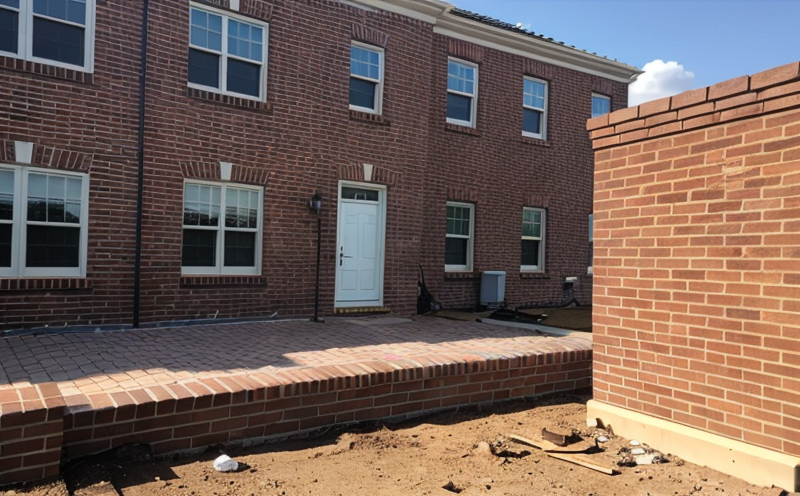EN 771 Geometric Properties of Bricks
The European Standard EN 771-3:2016 specifies methods for determining the geometric properties of bricks. This standard is essential for ensuring that bricks meet specified dimensions and tolerances, which are critical factors in the construction industry. The determination of brick geometry ensures structural integrity, aesthetic consistency, and compatibility with other building materials.
Bricks play a crucial role in the construction sector as they contribute to load-bearing capabilities, thermal insulation, and fire resistance within buildings. Ensuring that bricks meet the geometric requirements outlined in EN 771-3 is paramount for these functionalities. This standard encompasses various types of bricks commonly used in construction, such as fired common bricks (Class A) and non-fired bricks.
The testing procedure involves measuring critical dimensions including length, width, height, and thickness. The precision of these measurements directly impacts the quality control process within manufacturing facilities and subsequent building projects. Compliance with this standard not only enhances product reliability but also promotes consistent performance across various construction applications.
Accurate measurement tools are essential for performing EN 771-3 testing. These include calipers, micrometers, and other specialized equipment capable of providing precise readings necessary to meet the specified tolerances outlined in the standard. The accuracy of these measurements ensures that bricks conform to industry standards and can be confidently used in construction projects.
Understanding the nuances of EN 771-3 is vital for those involved in quality management, compliance oversight, research & development (R&D), and procurement processes within the building sector. By adhering to this standard, stakeholders ensure that bricks are manufactured to meet critical dimensional requirements, thereby promoting trustworthiness and reliability throughout the supply chain.
In summary, EN 771-3 provides a robust framework for assessing brick geometry, which is fundamental in maintaining high standards of quality within construction projects. It supports the achievement of desired performance characteristics while fostering confidence among all parties involved in the building industry.
Scope and Methodology
The scope of EN 771-3:2016 covers methods for determining the geometric properties of bricks, including fired common bricks (Class A) and non-fired bricks. The standard specifies procedures to measure key dimensions such as length, width, height, and thickness with precise tolerances.
| Dimension | Description | Tolerance |
|---|---|---|
| Length | The longest dimension of the brick | ±0.5 mm |
| Width | The shorter dimension perpendicular to length | ±0.5 mm |
| Height | The thickness or depth of the brick | ±1 mm for 25–75 mm thick bricks, ±1.5 mm for thicker bricks |
| Thickness | Equivalent to height; for uniformity | See Height tolerance |
The measurement process involves using calibrated instruments like micrometers or calipers, depending on the precision required. The test specimens should be representative of the batch being tested and must not show obvious defects that could affect measurements.
A detailed description of the testing procedure includes setting up the equipment, positioning each brick correctly for measurement, recording the values obtained from multiple readings, and calculating averages to determine compliance with specified tolerances. This method ensures accurate assessment of geometric properties, supporting quality assurance efforts in manufacturing facilities.
Industry Applications
| Application Area | Description |
|---|---|
| Fabrication of Masonry Units | Ensures correct size and shape for efficient masonry unit production. |
| Construction Quality Control | Verifies that bricks meet dimensional standards before use in construction projects. |
| Building Compliance Audits | Aids in ensuring compliance with local building codes requiring specific brick dimensions. |
| R&D and Innovation | Supports development of new brick technologies by validating performance characteristics against standards like EN 771-3. |
| Procurement Standards Setting | Establishes benchmarks for suppliers to meet, enhancing overall product quality in the supply chain. |
| Quality Assurance Programs | Facilitates consistent production processes through regular monitoring of brick dimensions. |
| Building Inspection Services | Provides data needed for inspections to verify compliance with construction specifications. |
Compliance with EN 771-3 ensures that bricks are reliable and perform effectively in various applications. Fabricators can rely on consistent measurements, while quality assurance teams benefit from precise dimensional verification. In construction projects, accurate brick geometry supports load-bearing capabilities and aesthetic consistency. Compliance officers and R&D engineers alike find value in this standard for setting procurement standards and validating new products.
For building inspection services, EN 771-3 provides critical data that helps verify compliance with local regulations and ensures the structural integrity of buildings. By adhering to this standard, stakeholders maintain trustworthiness and reliability throughout the supply chain, ultimately contributing to successful construction projects.
Eurolab Advantages
EuroLab offers comprehensive testing services for EN 771-3 compliance, providing clients with accurate, reliable, and reproducible results. Our state-of-the-art facilities are equipped with high-precision measuring instruments suitable for precise brick geometry assessments.
We employ experienced technicians who are thoroughly trained in applying the methodologies outlined in EN 771-3 to ensure consistent quality across all tests performed. This expertise guarantees that clients receive timely reports containing detailed measurements and analyses, enabling them to make informed decisions regarding their projects.
Our commitment to excellence extends beyond just testing; we also offer technical support services to help users understand the nuances of EN 771-3. Our team can provide guidance on selecting appropriate measurement tools, interpreting results, and implementing best practices for maintaining compliance with this standard.
EuroLab’s dedication to accuracy and reliability ensures that our clients receive robust evidence supporting their claims regarding brick geometry compliance. By choosing EuroLab, you benefit from an established reputation in the field of testing services, backed by years of industry experience and a commitment to meeting customer needs.





